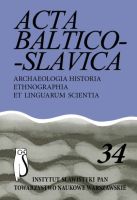O potrzebie podjęcia badań nad radziecką wersją języków mniejszości narodowych byłego Związku Radzieckiego
About the need to take up research concerning the russian version of former Soviet Union’s national minorities’ languages
Author(s): Jolanta Mędelska, Marek CieszkowskiSubject(s): Language and Literature Studies
Published by: Instytut Slawistyki Polskiej Akademii Nauk
Keywords: social-political and cultural situation in post-revolutionary Russia; Russian types of national languages; German Russian language
Summary/Abstract: Research on the so-called Polish Russian language of the interwar period, i.e. specific type of contemporary Polish used within the territory of the Russian empire in post-war twenties, has been successfully developing for 10 years. There were numerous articles published on this topic and recently the first two-volume monography came out. According to the authors of this article, it is worth using the experience of persons researching the Polish Russian language and taking up studies on Russian types of many other languages that were used in the Soviet Union during the early post-revolutionary period. It is in particular about languages of those national minorities that had their own countries outside the Soviet Union (for instance the Germans, French, Greek, Latvians and Finns). Thanks to the so-called Lenin’s national politics, introduced at the beginning of the twenties in relation to all nationalities residing in the Soviet Union, there was mass production of various documents, propagandist materials, books, school books with the mother tongue as the lecture language, didactic materials for institutions fighting illiteracy of adults etc. published in their mother tongue. Nowadays this entire publishing production is a great source reflecting the state of national languages of those days – languages that were impregnated with various Russian and Soviet idioms, abounding in strange new-coined words. Some of the above changes are presented by the authors on the example of the German Russian language of the post-revolutionary period.
Journal: Acta Baltico Slavica
- Issue Year: 2010
- Issue No: 34
- Page Range: 103-119
- Page Count: 17
- Language: Polish

